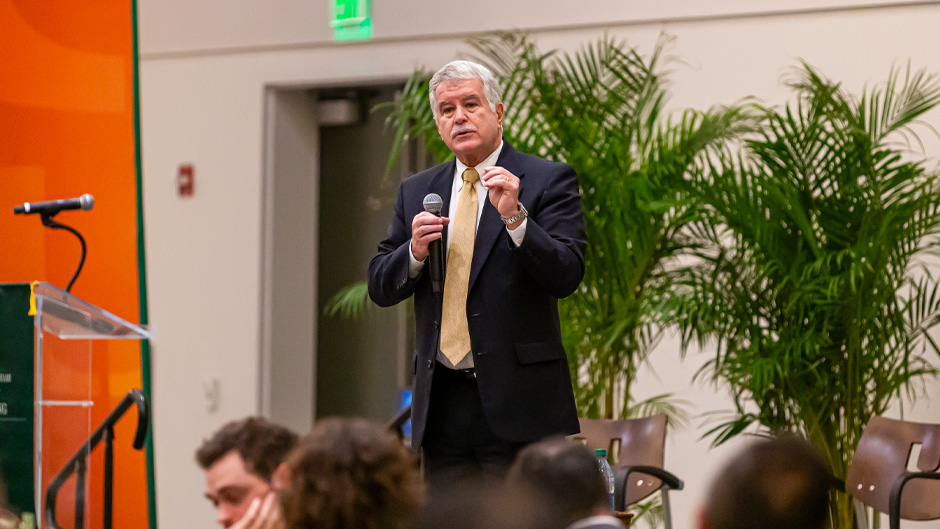On average, it takes about five years to identify rare genetic diseases in children. And one in 10 kids are predisposed to a genetic disorder.
It typically involves families shifting from one specialist to another before the child's confluence of symptoms finally leads them to a geneticist, who can order the right tests and eventually analyze the genetic markers of a specific disease, so the patient can finally be treated properly. The wait may be even longer for adults.
But during the time it takes to pinpoint what's wrong, a disease can progress violently.
That is why computing experts from the University of Miami Frost Institute for Data Science and Computing (IDSC) are partnering with Boca Raton-based AI software company, SIVOTEC Bioinformatics, to infuse the latest technology tools into their GENA platform to help geneticists and physicians identify rare genetic diseases faster so that the platform can continue to expand and serve a wider audience.
"The earlier we attack these horrific diseases, the better," said Pete Martinez, a College of Engineering alumnus, and experienced technology leader who founded SIVOTEC to help speed up this process.

Pete Martinez is an alumnus of the College of Engineering who founded SIVOTEC.
GENA has now helped to identify rare genetic diseases in 162,000 pediatric patients across 40 countries, mostly in children's hospitals, Martinez said.
"We are thrilled that SIVOTEC has selected IDSC to advance the development of its GENA Private Language Model," said Guillermo "Willy" Prado, interim executive vice president for academic affairs and provost at the University of Miami. "This platform is poised to redefine the future of learning, diagnosis, treatment, and research in health care. With our unmatched expertise, the University of Miami is uniquely positioned to bring together health systems, engineers, and entrepreneurs in support of this groundbreaking platform."
Justin Gammage, director of data science partnerships at IDSC, agreed.
"This is not just about business; it's about transforming how people's health care is managed, especially for those people who have rare conditions," he said.
Martinez also hopes to expand the platform's reach to more doctors across the world and identify genetic diseases in adults, all by harnessing the latest AI technology. Engineering professor and IDSC core faculty member Kaan Inal will lead a team to innovatively broaden the GENA AI platform, which is currently able to identify rare pediatric genetic diseases in seconds. Meanwhile, it used to take a geneticist about three days to identify a rare disease, Martinez said. They are also hoping to make the platform more insightful and to include language that is understandable to physicians without expertise in genetics.
"Genetics are the architecture of the body, yet it is a science that very few physicians know much about—it's typically about two chapters in the medical school biology course," Martinez said. "So, we are using AI to bring the subject to the more than 1 million pediatricians, primary care physicians, and specialists in this country."
The relationship between SIVOTEC and the University began in 2018, when Martinez learned there was a pediatric geneticist at the University who had created a program to help expedite the disease identification process. Martinez worked with the University's Office of Innovation to license the technology, and to integrate it into the AI platform, called GENA.
Fast forward seven years, and Gammage said IDSC can update an existing program with the most advanced technologies.
"Geneticists across the U.S. are already using GENA's existing data analytics platform, but we are moving it to a greater AI-enabled platform," Gammage added. "We will also be adding a lot of features to improve functionality."
Set to be delivered by the end of 2025, the new GENA platform will also offer treatment options tailored to the individual patient's genes through what is called a private language model, Martinez said. This will remove any identifying patient data but match their genetic components with patient research from sources like the National Institutes of Health and Johns Hopkins University. Then, evidence-based, time-tested treatment options will be suggested by the platform to the physician, Martinez added.
"We call it a private language model (PLM) because it is all based on trusted data," said Martinez, who spent three decades as an executive at IBM before starting SIVOTEC. "We are not exposing a patient's data to anyone else, and the data we are bringing to doctors and patients is very focused on quality and timeliness."
The next generation GENA will also be able to explain diseases and treatment options in understandable language, so that patients can also understand potential treatments.
"This is a huge opportunity for IDSC to demonstrate that in addition to doing outstanding academic research with faculty across the University, we are also a tremendous resource for businesses in southern Florida to support their growth and product development."
Martinez hopes to continue working with IDSC to improve their AI platform over time, starting with rare pediatric genetic diseases, and adding more genetic diseases in the future that would represent the total human condition.
"We consider this to be a continuous partnership, and as the models improve, we will expand to proactive, predictive, and personalized health," he said.






